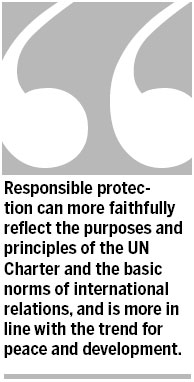
UN-authorized humanitarian intervention should seek to protect innocent civilians, not a change of government
In recent years, the West's "neo-interventionism" under the banner of "responsibility to protect" has caused tremendous controversy in the international arena. As a permanent member of the UN Security Council, China should unequivocally advocate "responsible protection".
The responsibility to protect doctrine, which is supposed to prevent and halt genocide, war crimes, ethnic cleansing and crimes against humanity, was first put forward by Canada's International Commission on Intervention and State Sovereignty in a report it submitted to the United Nations in 2001. It then was included in the Outcome Document of the 2005 World Summit.
In early 2011, NATO-led multinational forces launched air strikes against Libya and brought about a regime change. The West called this the first implementation of the responsibility to protect.
Since the 1990s, the West has introduced an array of ideas, such as "humanitarian intervention", "human rights above sovereignty" and "exceptionalism", in an attempt to provide a theoretical basis for interfering in the internal affairs of other countries. Responsibility to protect is merely the latest addition to this list.
Supporters of responsibility to protect argue that armed intervention is a "moral responsibility" as long as it is done for "humanitarian purposes". However, in practice, as Libya clearly showed, it has proved nothing more than the pursuit of hegemony in the name of humanity.
Former President of the UN General Assembly, Miguel d'Escoto Brockman, a Nicaraguan diplomat, said that the supposed impartiality of the responsibility to protect is just a cover to legitimize armed interference by rich Western powers in the affairs of poor countries, and a more accurate name for the concept would be the "right to intervene".
As Libya demonstrated, the responsibility to protect can be abused to change a country's government, which goes against the purposes of the UN Charter, the principle of national sovereignty and the principle of noninterference in internal affairs.
Who should be responsible for the consequences of any humanitarian intervention? UN data shows that hundreds of thousands of people are destitute and homeless in Libya, partly as a result of military action by the West and that there are now over 5,000 armed groups beyond government control, which has led to violent conflicts becoming the norm and countless civilian casualties.
A report released by the UN Human Rights Council on March 2 found that both sides in Libya committed "crimes against humanity and war crimes". Russia is insisting that NATO's actions in Libya be investigated and those found guilty of crimes punished.
Some analysts, referring to the wars in Afghanistan and Iraq that have caused more than 100,000 civilian deaths, even say that such kind of humanitarian intervention is "a means coming from hell". Frequent use of military forces in the name of "protection" is bound to encourage bellicosity in international relations and likely to open a Pandora's box of disasters.
With this in mind, the international community has been reconsidering the responsibility to protect doctrine.
Brazil's Permanent Representative to the UN, Maria Luiza Ribeiro Viotti, presented the concept of "responsibility while protecting" in 2011, seeking to reflect the serious defects regarding the implementation of military measures in the responsibility to protect framework. Brazil believes that "responsibility in protection" should be the focus for the international community.
Some scholars suggest that rather than humanitarian intervention through military means, it is better to strengthen "humanitarian diplomacy", such as providing funding to improve public health services and resettling refugees, as a means to fulfill the responsibility to protect through nonviolent means, which will have a more positive and lasting impact.
But considering the consequences caused by responsibility to protect in practice, countries should embrace the idea of "responsible protection", which includes some basic elements:
First of all, any intervention should protect innocent civilians in the country concerned as well as regional peace and stability, rather than specific political factions or armed forces.
Second, the UN Security Council is the only body with the legitimacy to implement "humanitarian intervention". No other body or individual state should claim this right.
Third, the necessary precondition for the implementation of force must be that all diplomatic and political means of settlement have been exhausted. Though diplomatic efforts and other non-military means usually take a long time, their effects are long lasting and have less negative consequences.
Fourth, the goal of protection should be to prevent or alleviate a humanitarian disaster, rather than the overthrow of a government.
Fifth, national reconstruction after intervention and protection should be given sustained support. The country and people should never be left in a mess.
Sixth, the UN should establish a monitoring mechanism, and an effective evaluation and accountability system.
In short, responsible protection can more faithfully reflect the purposes and principles of the UN Charter and the basic norms of international relations, and is more in line with the trend for peace and development.
The author is vice-president of the China Institute of International Studies.
(China Daily 03/15/2012 page9)